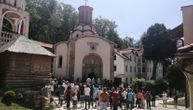Life in Bozevce, a village that remembers Prince Lazar: Waiting with buckets for soup kitchen meals
For the locals of this remote village, a meal from the soup kitchen is often the only thing they will eat all day
For many villagers in Bozevce, located between Kosovska Kamenica, Novo Brdo and Gjilane in Kosovo and Metohija, a meal from the soup kitchen is the only thing they will eat during the day - and when it doesn't arrive for some justified reason, they go hungry.
About 40 Serbs live in the remote village of Bozevce, mostly aged 70 and over, with only a few younger people among them. The village can be reached from the direction of Novo Brdo partly by paved and after that by macadam road, passing by the medieval Prilepac, the birthplace of Serbian Prince Lazar. All together, a trip of about 25 kilometers.
After many rounds of destruction under the Turks and others who conquered this region during its turbulent history, only the foundations remain of the former fortification of Prilepac, which stands on the right side of a hill.
On the north side, at an altitude of 700 meters above sea level, the macadam road leads to Bozevce - at once a picturesque and sad village. It waas mentioned in medieval times, and the locals proudly say that Prince Lazar himself used to come to their church as a boy.
Waiting for food from the soup kitchen
Little is left of the medieval glory and power when this region was on the world map due to its rich mines. Life here is very tough, people have no jobs and permanent sources of income and are forgotten by almost everyone. Outsiders rarely come here, so an unfamiliar car is immediately spotted - a sign for people carrying food buckets to come down from their yards to the main road.
Stojanka was already waiting with two white buckets by the side of the road, thinking that people from the soup kitchen were bringing food. It was already past 2 pm and she was hungry.
"I live with my stepmother, my mother's been gone for a long time. Here I am waiting, how is it they won't come? Sometimes they don't come, there's a power cut or something, so they can't prepare the food."
"It's valuable to me to eat something, beans, pasta, soup, bread. I'll wait a while longer, maybe they'll come. Until they do, I have these apples," says Stojanka, waiting beside a wire fence onto which she hanged her two empty food buckets.
Another woman from the other hamlet was also waiting next to the main road. This is Milovanka Arsic, an old woman whose facial features reflect her former beauty, while the wrinkles tell of the life that created them. Next to her is her granddaughter, who is returning from school.
"How old am I, I can't remember. There have been many (years). There are several of us in the house. If there weren't for the soup kitchen, I don't know what we'd do. It's difficult to live here, especially in winter. Snowdrifts close the roads, no one is coming. It used to be different, there were a lot of people, life, and now everything is slowly disappearing. There are fewer people, young people are very few, but there's nowhere to go," says Milovanka.
Stana Stankovic, who doesn't depend on the soup kitchen, also lives in Bozevce.
The children have left
"It's hard here, we don't have proper living conditions. When we were younger, somehow we could withstand anything, now it's much harder. My husband has a pension, we keep small livestock and do as much agriculture as we can. The children have mostly left, they visit when they can. We don't have transportation to the nearest town, Kamenica, to the stores, doctors and everything else that's there, 20 kilometers away," adds Stana Stankovic.
Bozevce is a picturesque village, peaceful and silent, where time has stood still since the late 1980s. People gather here for big holidays, when many other Serbs from the Kosovo Pomoravlje region come. The village church was rebuilt in 1865, on the foundations of a medieval one.
There is an oak tree in the church yard, whose trunk would take several people to wrap their arms around. Judging by its bark, one would say the tree is several centuries old, and the locals say their ancestors told them it was indeed a centuries-old tree.
Only the hawk's cry in the sky above disturbs the silence in Bozevce. There is hardly any phone service, and loneliness and misery go hand in hand. Animals are also rare, cows in particular, because the elderly who are left alone can no longer do heavy agricultural work. The few animals in the village, especially large cattle, are particularly guarded as livestock theft often occurs in this area.
Only by car, by those who have one
At the exit of the village, Ratko Nikolic waited with buckets, to make sure once again that people from the soup kitchen would come and bring food.
"We live as we must, we don't have pensions. We get bread, something cooked from the soup kitchen and that meal is often the only one we have. Kosovska Kamenica is the closest town and can only be reached by car, by those have one," Nikolic adds.
Despite difficult living conditions, the inhabitants of Bozevce remain and survive in Kosovo and Metohija, safeguarding the Serbian statehood. Numerous Orthodox shrines are located in this area, many of which are in ruins, dating from the Middle Ages, a period when this area represented the economic strength of the Serbian state of Stefan Nemanja. For more than seven centuries, they have been a beacon of Orthodoxy and Serbian statehood in the Kosovo Pomoravlje and the Novo Brdo regions.
Bozevce awaits another winter in silence. Most of its residents are especially worried about the first snow and cold days, fearing whether they will be able to survive the cold and the lack of food, roads and means of transportation to the town.
(Sladjana Tasic)

